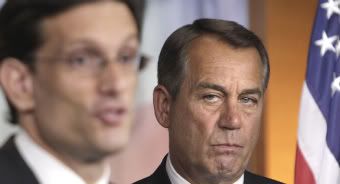"Wait...What?" Debt-Ceiling Recap, Week of July 10
By
Kyle Andrejczyk
Posted:
 A LOT of people have been asking me for details of what's been going on with the debt-ceiling. And rightly so, there's a flood of information out there. But here's the important stuff:
A LOT of people have been asking me for details of what's been going on with the debt-ceiling. And rightly so, there's a flood of information out there. But here's the important stuff:
On Thursday, July 7, President Obama met with Congressional leaders at the White House in an attempt to break the impasse in the debt-ceiling negotiations. Previous talks among the Gang of Six (really 5), and the Biden Group both broke down. The thinking here was that the Presidential gravitas might help to break the stalemate and get a deal hammered out before the United States defaults on it debt obligations on August 2.
Things haven't gone so well....
Sunday, July 10
- A late night 75-minute meeting does little in pushing the talks forward. Leaders can not agree even on the size and scope of package
- President Obama pushes for $4 trillion deficit reduction (including revenues from taxes), while Republicans push for a smaller ~$2 trillion deal consisting only of spending cuts.
Monday, July 11
- President Obama takes to the offensive in an early morning press conference denouncing Republicans' unwillingness to reach a “grand bargain” that would trim the deficit by $4 trillion dollars. “If each side takes a maximalist position, then we're not gonna get anything done...if not now, when?” asks the President. President Obama also affirms that he absolutely will not sign a short-term deal to raise the debt-ceiling without a plan to cut the deficit.
- At the WH meeting, House Minority Leader Eric Cantor proposes $353 billion in savings from cuts to Medicare/Medicaid.
- We also start to see some fracturing within the Republican party, particularly between House Speaker John Boehner and Eric Cantor. We learn that Boehner had allegedly met with Obama privately seeking to help achieve the “grand bargain” — which is anathema to Cantor.
Tuesday, July 12
- President Obama remains firm in his commitment to a “grand bargain” to reduce the deficit by $4 trillion over the next decade through a combination of spending cuts and revenue increases.
- Senate Minority Leader Mitch McConnell suggests a contingency plan that places responsibility for raising the debt ceiling squarely on President Obama. This way, the GOP could wash their hands of the debt-ceiling and pin the debt and bad economy on the Democrats going into next year's election cycle. The plan was met with a tepid response from members of his own party.
Wednesday, July 13
- Federal Reserve Chairman Ben Bernanke announces that U.S. default would send “shock waves” through financial markets
- This sentiment is echoed by Moody's Investors Service announcement that it is putting the U.S. triple-A credit rating on review for a downgrade.
- President Obama identifies $1.7 trillion in spending cuts he would be comfortable with during the meeting. Still no concessions from Republicans on taxes. The President still pushes for a “grand bargain” and refuses a short term deal to raise the debt-ceiling.
- Talks at the White House “blow up” in a heated exchange between the President and Eric Cantor. Obama apparently warns Cantor “don't call my bluff.” Despite the conflict, President Obama reportedly said “I'll see you tomorrow” before leaving the room. The exchange signals yet another growing impasse in the debt-ceiling negotiations.
- As White House talks start to falter, the formerly defunct Gang of Six meets. Absent Senator Tom Coburn indicates he might rejoin the Gang. Whatever plan the Gang formulates could end up being a part of the debt-ceiling deal.
Thursday, July 14
- Fault lines within the Republican leadership start to become very apparent. However, John Boehner and Eric Cantor say they're indeed “on the same page.” Reporters remain skeptical, citing a growing power struggle between the two since the start of the White House talks. This picture sums its nicely (AP Photo):
- Several Congressional leaders fault Eric Cantor for slowing down talks at the White House. Senate Majority Leader Harry Reid says he's “too childish” to be at the negotiating table. Sen. Chuck Schumer says that Cantor is “standing in the way” of any deal.
- McConnell's “last-ditch” plan starts to gain some traction as White House talks show signs of fracturing. Harry Reid is working with McConnell to pair his plan with $1.5 trillion in spending cuts identified by the Biden Group.
- At the WH, talks are brief and last only 80 minutes. President Obama gives leaders 36 hours to meet with their party members and come back to him with a plan. They are trying to build off a “foundation” of $1.7 trillion in spending cuts over the next decade
Friday, July 15
- In a morning press conference, President Obama uses the bully pulpit to maintain pressure on the Republicans for a “grand bargain” that includes increasing revenues. Although he did indicate he would be open to a smaller deal based only on spending cuts.
- The House Republican conference coalesces around the Cut, Cap and Balance Act, which would limit spending to 18% of GDP and include a balanced budget amendment to the Constitution. The Act has almost no chance of being approved by the Senate, White House, or the states. Instead, the vote will “clear the political deck” and give conservative lawmakers a voting record that will please their base.
- The Treasury Department announces that it has exhausted its options to free up money under the current debt-ceiling limit of $14.3 trillion.
Saturday, July 16
- GOP leaders ignore the 36 hour deadline set by President Obama on Thursday. Instead they are adhering the Cut, Cap and Balance Act as solution. Floor votes are set for mid-week next week.
Lastly, be sure to check out this great summary of the plans that have been discussed so far.
So talks at the White House have essentially failed to produce a deficit-reduction deal. The talks are now moving over to Congress where, besides the doomed Cut, Cap and Balance Act, several other plans are expected to emerge in the coming days. Sen. Tom Coburn is planning to unveil a plan that will reduce the deficit by $9 trillion. The Gang of Six (really 5) allegedly has a plan for saving $3.7 trillion. And Senators Harry Reid and Mitch McConnell have been at the negotiating table hammering out the details of McConnell's “last ditch” plan. President Obama has said he would like to have a plan out by July 22. At this point it seems McConnell's plan might be the most politically viable, but we still have a long way to go. And if the near-government-shutdown back in April is any indicator, there's a chance this could go right up to midnight of August 1.
Check back here and on our Facebook page for updates as the talks continue.
* * * * * * * * * * * *
Want to “Ask Kyle” a question on this or anything else? Send it to questions@nationalpriorities.org or post your “Ask Kyle” questions on Facebook at facebook.com/nationalpriorities.
